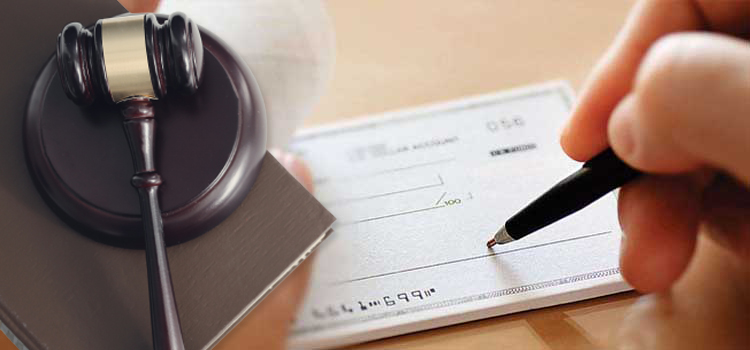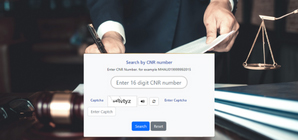Cheque Bounce Case Rules - Trace the Technicality
Posted On : December 27, 2022

Table of Contents
The cases of cheque bounce are increasing exponentially in India. Special courts are set up for dealing with bounced cheque cases so that similar matters are decided expeditiously. Knowledge of cheque bounce case rules helps safeguard own interests and escape uninvited trouble while dealing with legal proceedings.
If you recently signed a cheque and received information regarding dishonour, it comes as a bolt from the blue activating all the nerves. But how serious is the cheque bounce case? Cheque bounce case new rules in India make it difficult to evade legal proceedings. It is better to repay the debt amount. But the laws also make the penal provisions limited to debts and not all kinds of payments made through cheques are punishable. Hence, if you deal in cheques in business or otherwise, being wary of the cheque bounce case rules is a must. The blog here deals with all those minor cheque bounce rules which become a major block for parties due to a lack of awareness.
What is a Cheque Bounce Case?
When someone makes payment through a cheque against a legal debt, and the cheque is returned without encashment due to insufficiency of funds, section 138 of the Negotiable Instruments Act, 1881 applies. The law gives legal right to the person who owes such payment to initiate legal action for repayment. The provision is criminal in nature to catch hold of defaulters searching ‘how to escape from cheque bounce case’ fearing imprisonment. The cheque bounce punishment in India includes imprisonment of up to two years and a fine equivalent to double the amount involved in debt.
Cheque Dishonoured for Debt
Cheques drawn for XYZ reasons can not be subjected to initiating proceedings as per cheque bounce case rules. Only debts or legal liability give the cause of action in cheque bounce matters. The statement under section 138 of NI Act 1881 reads as “....for payment of any amount of money to another person from out of that account for the discharge, in whole or in part, of any debt or other liability…..”. Even the explanation to the above section reads “For the purposes of this section, “debt or other liability” means a legally enforceable debt or other liability”. Hence, cheques drawn for the purpose of gifts or donations are not enforceable through courts under section 138.
Cheque Bounce Notice
A notice through cheque bounce lawyers plays a vital role in legal proceedings for cheque dishonoured. As per the cheque bounce case rules, a legal notice has to be served within 30 days of the instance of dishonour. The purpose is to give the drawer of the cheque a proper notice regarding the cheque returned and a chance to repay. The notice here specifies a 15-day term to repay the debt amount. The cause of action for the cheque bounce case time limit starts here on the 16th day of serving such legal notice.
How to Settle a Cheque Bounce Case?
Like any other case proceedings, it starts with a cheque bounce complaint to the concerned magistrate. The aggrieved complainant puts forward all the relevant evidence, especially the bounced cheque, memo and documents proving the debt. The other party who defaulted through a dishonoured cheque is summoned by the court. Cheque bounce case rules suggest that the summons/ notice should not be avoided. Both the parties are duly heard and the decision is arrived at based on relevant facts and applicable laws. Courts still give the person a chance to pay back the amount involved. The cheque bounce case solution refers to repayment only. The new rules for cheque bounce and the increasing number of cases make it difficult to evade repayment or punishment.
FAQs Regarding Cheque Bounce Case Rules
Q- What is the time limit for cheque bounce cases?
A- There is a time limit for instituting a case starting at the expiry of 15 days of serving a legal notice for cheque bounce. Such notice can be served within 30 days of receiving the cheque bounce memo from the concerned bank. If it is about the cheque bounce case time limit, the case may take 2-3 years for a conclusion.
Q- What is the minimum amount for a cheque bounce case?
A- There is no pecuniary limit for initiating cheque bounce case procedure in India. The amount involved in a cheque bounce case may be the deciding factor for realising the penalty imposed on the defaulter.
Q- How do I settle a cheque bounce case?
A- The purpose of case proceedings in a cheque bounce is repayment as reiterated by the Hon’ble Supreme Court. Hence, repayment always holds the scope for the settlement of a dishonoured debt.
Q- How serious is the cheque bounce case?
A- A cheque bounce case is not serious until the intention to repay is there or a genuine inability to repay the amount is proved. But what happens if the cheque bounces in India? Being a master criminal in nature, cheque bounce case punishment may lead to imprisonment as well, apart from a fine.
Q- What is the new rule for cheque bounce cases?
A- The new law imposes harsher penalties for repeat offenders. If a person is convicted of a second or subsequent cheque bounce, they may face up to two years in prison and a fine of up to twice the amount of the cheque.
Q- What is the legal procedure for a bounced cheque?
A- In a cheque bounce instance, you must issue a notice within 15 days of the cheque bounce and must register a complaint within 30 days of getting the acknowledgement receipt.
Q- What are the case laws for cheque bounce?
A- (1) ANNS Rajasekhar v/s Augustus Jeba Ananth (2019) - The Supreme Court stated that the presumption under Section 139 of the N.I. Act is refutable on the existence of a legally enforceable debt for the purposes of Section 138. To refute the presumption, the proportionality test will be applied. (2) Kishan Rao v. Shankargouda (2018) - In Section 138 instances, the accused's simple denial of debt or culpability is insufficient to satisfy the burden of proof. This was decided in this case.
Q- What is the maximum amount for a cheque bounce case?
A- There is no maximum amount for cheque bounce cases.
























